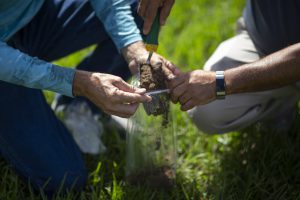Want to get a head start on planting this spring? Then the time to soil test is now!
Soil testing is an easy way to determine the nutrient management needs ahead of time. This can allow for easier planning and budgeting of resources for farmers and homeowners alike. It is an easy enough procedure that you can complete the process on your own and send off for the results. If you would like help, your local extension agents are more than willing to help you complete your soil testing needs.

Why soil test?
Crop production best practices often include intensive nutrient management to balance both the possible environmental effects and crop yields. Soil amendments can be an environmental concern. Suwannee County is included in the Suwannee River Basin Management Action Plan to reduce nitrate and phosphate usages across all areas. Soil testing enables you to find out the makeup of your soil and helps you determine how much lime and fertilizer you need to apply so you don’t over fertilize and potentially risk environmental runoff. Properly monitoring your nutrient input requirements can also help tailor your amounts of fertilizer you add to save you time and money. All it takes is a cheap $10 soil test to get a baseline for your spring planting.
What will a soil test tell me?
Soil test results will give you information on:
- Current pH levels of your soil.
- Fertility levels of the principal nutrients.
- Type and quantity of lime your soil needs.
- Nutrients need to be added to your soil as fertilizer.
- Amount of fertilizer your crop and soil needs.
Where do I go to get a soil test kit?
You should head to your local UF/IFAS Extension office to pick up a soil test kit. Suwannee County office website can provide you with all contact and address information. You should receive directions and information form that will be sent to the UF IFAS Extension Soil Testing Lab in Gainesville along with your soil samples themselves. You will also receive paper soil test bags to place your samples in. There are different tests and corresponding forms to use depending on if you are collecting samples as a producer, landscape and vegetable garden, citrus, etc… Correct forms can be found at the soils lab website as well.
In part 2 we will discuss how to take a proper soil sample to make the most out of your submission
Like what you read? Click the like or heart button below! Feel free to follow me for more great blog information about agriculture and commercial crops in Suwannee County
References:
Soil Testing (Circular 239) by Gerald Kidder and R.D.Rhue. Published by: University of Florida Soil and Water Science Department (rev. 9/2003)
 3
3
